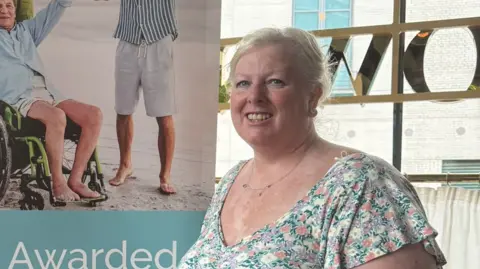MP proud to lead Commons incontinence debate
 Sonia Kumar
Sonia KumarA Labour MP has said she is proud to be leading a debate about incontinence that is the first of its kind in the House of Commons.
Sonia Kumar, MP for Dudley, will chair the backbench business committee debate on Thursday, which will shine a light on the issues faced by those with pelvic health issues.
Kumar said the issue "affected millions across the UK", however it remained "overlooked and under-discussed".
She hoped the debate would help to bring incontinence "out of the shadows" and give it the "attention it deserves".
The National Institute for Health and Care estimates that 34% of women had urinary incontinence.
The Dudley MP, who is a physiotherapist, said she had worked closely with women to help them manage the challenges of pelvic floor dysfunction.
She had previously spoken about pelvic health during a Westminster debate on women's health and received a "wave of responses" from people who had similar experiences.
"These are not just medical conditions, they are deeply personal challenges that can significantly impact individuals' dignity, independence, and mental wellbeing," Kumar said.
 Leanne Shakespeare
Leanne ShakespeareMum-of-four Leanne Shakespeare, 51, said she experienced incontinence for nearly 30 years after she had a breach birth.
"I have to wear towels when I leave the house, I'd love to go swimming again but I can't.
"When I'm on holiday I couldn't take my shorts off or go in the water."
Ms Shakespeare, who is from Kingswinford, said it had impacted her confidence and mental health.
She added that it had taken her 10 years to tell anyone what she had experienced.
"It's a taboo and it isn't talked about enough, now I just have to get on with it and try not to let it stop me."
Ms Shakespeare said the debate was a "great idea" and she planned to "follow it on TV".
Polly Weston, co-chair of the Association for Continence Professionals, was pleased that the issue had "finally gained traction".
"The government is talking about something that the nation is secretly trying to deal with", she said.
"People will quite happily talk about other medical problems, but the minute you talk about your bowels or bladder, it doesn't seem to be a conversation."
Ms Weston said she had spoken to cancer patients who found it "more complex" to talk about their bladder and bowels than the treatment they had received.
She added that the privacy towards incontinence was "culture and learnt behaviour" and called for health professionals to "ask patients more open questions" about the issue.
Follow BBC Birmingham on BBC Sounds, Facebook, X and Instagram.
